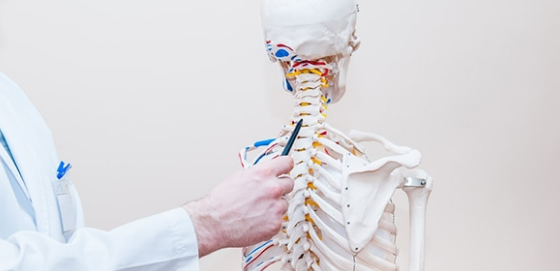In this article, we will emphasize Homeopathy Treatment For Cervical Spondylosis. Cervical spondylosis, commonly known as neck osteoarthritis, is a condition that affects millions worldwide. It involves the gradual wear and tear of the cervical spine, including the vertebrae, intervertebral discs, ligaments, and tendons. This degeneration can lead to persistent neck pain and discomfort, significantly impacting daily activities and quality of life. Fortunately, homeopathy offers several effective remedies to manage the symptoms of cervical spondylosis. Here, we explore five top homeopathic medicines that are renowned for their efficacy in treating cervical spondylosis and alleviating neck pain.
Understanding Cervical Spondylosis
Cervical spondylosis primarily affects the cervical spine—the upper part of the spine located immediately below the skull, consisting of seven vertebrae. These vertebrae are separated by spinal discs, which serve as cushioning shock absorbers that bear the spine’s stress. Ligaments connect these bones, and tendons connect muscles to bones, facilitating movement and stability. As we age, these structures begin to deteriorate, leading to the symptoms associated with cervical spondylosis.
Homeopathy Treatment For Cervical Spondylosis: A Comprehensive Guide
Almost everyone will experience neck pain at some point in their life. However, when the pain becomes chronic and debilitating, it can significantly affect your quality of life. Cervical spondylitis, also known as cervical spondylosis, is a degenerative condition that affects the neck and causes pain, stiffness, and limited range of motion. Although there is no cure for cervical spondylitis, homeopathic treatment can provide relief from symptoms and improve overall well-being.
Integrating Homeopathy into Cervical Spondylosis Management
At Aura Homeopathy Clinic we Integrate these homeopathic remedies into your management plan for cervical spondylosis can offer significant relief from pain and improve neck mobility. However, it’s essential to consult with a qualified homeopathic practitioner to tailor the treatment to your specific symptoms and health condition. A professional will consider your individual symptoms, medical history, and overall health to select the most appropriate remedy.
Effective Homeopathy Treatment For Cervical Spondylitis: A Natural Approach to Symptom Management
Cervical spondylosis, a common condition resulting from age-related changes in the spine, can lead to significant discomfort and mobility issues. Homeopathy offers a natural and effective approach to managing the symptoms of cervical spondylosis, including pain, stiffness, numbness, tingling in the upper limbs, and vertigo. This article explores how homeopathic treatments can not only alleviate these symptoms but also help slow the progression of this degenerative condition.
How Homeopathy Addresses Cervical Spondylosis?
Homeopathy is based on the principle of ‘like cures like,’ and treatments are tailored to the unique symptoms and health profile of each individual. In cases of cervical spondylosis, homeopathic remedies are carefully selected to address the specific symptoms experienced by the patient, providing targeted relief without the side effects often associated with conventional medications.
Key Benefits of Homeopathy Treatment For Cervical Spondylosis
- Symptomatic Relief: Homeopathic remedies are highly effective in reducing symptoms associated with cervical spondylosis. Patients often report relief from chronic pain and stiffness in the neck, which are common complaints linked to the condition.
- Improvement in Mobility: By alleviating stiffness and discomfort, homeopathy can enhance neck mobility, allowing individuals to perform daily activities with greater ease.
- Reduction in Nerve Symptoms: Numbness, tingling, and the sensation of “pins and needles” in the upper limbs are symptoms that can be distressingly common with cervical spondylosis. Homeopathic treatments can help manage these sensations effectively.
- Management of Vertigo: Vertigo or dizziness associated with cervical spondylosis can be particularly debilitating. Homeopathy offers remedies that specifically target and reduce vertigo, improving the patient’s balance and overall stability.
- Slowing Degenerative Changes: Beyond symptomatic relief, homeopathic remedies may help slow the progression of degenerative changes in the cervical spine. This preventive aspect is crucial in managing long-term health and maintaining quality of life.
Implementing Homeopathy Treatment For Cervical Spondylosis
When considering homeopathic remedies for cervical spondylosis, it is essential to consult with a qualified homeopathic practitioner. The practitioner will conduct a thorough assessment, including the history of your symptoms and a detailed health profile, to select the most appropriate remedy. Treatment plans in homeopathy are personalized; what works for one individual may not be effective for another, even if they share similar symptoms.
What is cervical spondylitis?
Cervical spondylitis is a condition that affects the cervical vertebrae, which are the small bones that make up the spine. As people age, the cartilage that cushions the joints between the vertebrae begins to wear away, causing bone spurs and narrowing of the spinal canal. This narrowing can put pressure on the nerves that run through the spine, leading to pain, numbness, and weakness in the arms and hands. Cervical spondylitis is a common condition in older adults, but it can also affect younger people who engage in repetitive neck movements or have had a neck injury.

Symptoms of cervical spondylitis
Cervical spondylitis symptoms can vary from person to person, but some common symptoms include:
• Neck pain and stiffness
• Headaches
• Pain, numbness, or weakness in the arms and hands
• Limited range of motion in the neck
• Muscle spasms in the neck and shoulder area
• Tingling or tingling in the arms and hands
Understanding the Causes of Cervical Spondylosis: From Wear and Tear to Spinal Degeneration
Cervical spondylosis, commonly known as neck arthritis, affects millions of people as they age. This condition stems primarily from the natural wear and tear of the cervical spine, which comprises the upper part of the spine and supports the neck. Understanding the underlying causes of cervical spondylosis can help individuals seek timely treatment and potentially slow the progression of this degenerative condition.
Age-Related Degeneration: The Primary Culprit
The most significant factor contributing to cervical spondylosis is age-related degeneration of the cervical spine. As we age, our spinal discs, which act as cushions between the vertebrae, begin to deteriorate. This process is natural and can lead to various structural changes in the spine, including:
- Dehydration and Herniation of Intervertebral Discs
The intervertebral discs in our spine play a crucial role in absorbing shocks and maintaining spinal flexibility. Each disc consists of an outer fibrous layer and a gel-like center. Over time, these discs can dehydrate, losing their flexibility and effectiveness as shock absorbers. This dehydration increases the risk of the discs cracking and the inner gel leaking out, a condition known as disc herniation or slipped disc. Herniation can cause the disc material to press on the spinal cord and nerves, leading to pain and other neurological symptoms.
- Formation of Bone Spurs
As the discs degenerate, the body may try to strengthen the spine by forming extra bony growths known as bone spurs. While these growths are intended to stabilize the spine, they can inadvertently compress the spinal cord and nerves. This compression can result in pain and can limit the mobility of the spine, contributing further to the symptoms of cervical spondylosis. Also Read Homeopathy treatment For Celiac Disease.
- Ligament Stiffness
Ligaments are bands of tissue that connect bones to each other and provide stability to the spine. With advancing age, these ligaments can become stiffer, reducing the flexibility of the neck. This stiffness can lead to decreased neck movement and increased discomfort, often manifesting as neck stiffness and pain.
Injury-Induced Cervical Spondylosis
Apart from age-related changes, injuries to the cervical spine can also precipitate early changes associated with cervical spondylosis. Accidents or trauma to the neck can accelerate the degeneration of spinal components, leading to earlier onset of the condition. Individuals who have experienced significant neck injuries should be particularly vigilant about the signs of cervical spondylosis.
Understanding the Risk Factors for Cervical Spondylosis
Cervical spondylosis, commonly known as neck arthritis, is a condition that affects the cervical spine, leading to stiffness and pain in the neck. This degenerative disorder predominantly impacts older adults but can be influenced by various other factors. Recognizing the risk factors associated with cervical spondylosis is crucial for prevention and effective management of the condition. Here’s a closer look at the major contributors to the development of cervical spondylosis.
1. Age-Related Degeneration
Age is the most significant risk factor for cervical spondylosis. As a degenerative disorder, the likelihood of developing cervical spondylosis increases with age. Symptoms typically begin to appear after the age of 40, and by the time individuals reach 60, over 85 percent are likely to experience some degree of cervical spondylosis. The natural wear and tear on the spine that occurs with aging can lead to significant changes in the cervical vertebrae, discs, and other structures in the neck.
2. Occupational and Recreational Strain
Certain occupations and sports activities that involve repetitive motion, bending, or twisting of the neck can overstrain the neck muscles and accelerate the onset of cervical spondylosis. Occupations like painting or sports like badminton require continuous neck movements that can predispose individuals to neck degeneration. Similarly, regularly lifting heavy weights can contribute to spinal stress and eventual degenerative changes.
3. Prolonged Improper Posture
Maintaining an improper neck posture over extended periods is a common risk factor in today’s digital age. Activities such as working on computers that are not ergonomically aligned or frequently using mobile devices in uncomfortable positions can place excessive stress on the cervical spine. This continuous strain can lead to pain and accelerate degenerative processes in the neck.
4. Previous Neck Injuries
Individuals who have sustained neck injuries are at a higher risk of developing cervical spondylosis. Accidents or trauma to the neck can cause immediate damage to the cervical spine and hasten the degenerative changes that contribute to spondylosis.
5. Underlying Arthritis
Arthritis, particularly osteoarthritis, can predispose individuals to cervical spondylosis. Joint inflammation associated with arthritis can exacerbate the wear and tear on the cervical discs and vertebrae, increasing the risk of developing cervical spondylosis.
6. Genetic Factors
A family history of cervical spondylosis indicates a genetic predisposition to the disease. Individuals with relatives who have been diagnosed with cervical spondylosis may have an increased likelihood of developing the condition themselves.
7. Smoking
Smoking has been linked to numerous health issues, including an increased risk of cervical spondylosis. The toxins in cigarette smoke can contribute to the deterioration of spinal tissues and exacerbate the degenerative processes in the cervical spine.
Recognizing and Managing Symptoms of Cervical Spondylosis
Cervical spondylosis, often referred to as neck arthritis, is a common age-related condition that affects the joints and discs in your cervical spine, which is located in your neck. Understanding the symptoms can lead to early detection and effective management, helping to maintain a better quality of life. Here’s what you need to know about the symptoms of cervical spondylosis and how lifestyle adjustments can help manage this condition.
Symptoms of Cervical Spondylosis
Cervical spondylosis manifests in several ways, depending on the severity and the specific areas of the neck that are affected:
- Neck Pain and Stiffness: This is the most apparent symptom of cervical spondylosis. The pain may be confined to the neck or may radiate down to the arms, hands, and fingers, which often worsens with movements.
- Nerve Compression: If the spinal cord or nerve roots become pinched due to degenerative changes in the cervical spine, symptoms can include numbness, tingling, and weakness in the arms. This might also lead to coordination problems and difficulties with walking, reflecting more severe compression.
- Dizziness and Vertigo: Some individuals may experience dizziness or vertigo, particularly if the cervical spondylosis affects blood flow or nerve function that influences balance.
Lifestyle Changes to Manage Cervical Spondylosis

Making specific lifestyle changes can significantly alleviate the symptoms of cervical spondylosis and improve neck health:
- Regular Exercise: Engaging in regular, gentle exercises can help keep the neck muscles strong and limber, reducing the stiffness and pain associated with cervical spondylosis.
- Physiotherapy: Targeted physiotherapy exercises are excellent for strengthening neck muscles and maintaining the flexibility of the cervical spine. A physiotherapist can tailor exercises to your specific condition to ensure the best outcomes.
- Proper Posture: Maintaining correct posture while sitting, standing, and lying down is crucial. Proper ergonomic adjustments at your workspace, such as positioning your computer monitor at eye level, can prevent unnecessary strain on your neck.
- Avoid Stressful Activities: It’s advisable to avoid activities that put excessive stress or strain on your neck, such as lifting heavy weights or engaging in high-impact sports that might jolt or compress the spine.
- Heat Therapy and Massage: Applying warm compresses to the neck or receiving gentle neck massages can help relax the cervical muscles and alleviate pain.
- Sleeping Position: Use a supportive pillow and strive to keep your neck aligned with your spine while sleeping. Avoid using overly thick or multiple pillows that can strain your neck during the night.
Homeopathic treatment of cervical spondylitis
Homeopathy is a holistic approach to health that focuses on treating the whole person, not just symptoms. Homeopathic treatment for cervical spondylitis aims to reduce pain, stiffness, and inflammation, improve range of motion and restore overall health and well-being.
Here are some common homeopathic remedies used to treat cervical spondylitis:
• Rhus toxicodendron: This remedy is used for neck pain and stiffness that worsens with rest and improves with movement. It is one of the Best Homeopathic Medicine for Cervical Spondylitis Treatment.
• Bryonia alba: This remedy is used for sore throats that are worse with movement and better with rest.
• Kalmia latifolia: This remedy is used for neck pain that radiates down the arm and is accompanied by numbness and tingling in the fingers.
• Hypericum perforatum: This remedy is used for sore throat that is accompanied by shooting or burning pain.
In addition to homeopathic remedies, your homeopath may also recommend lifestyle changes such as exercise, posture correction, and stress reduction techniques.
Conclusion
Cervical spondylitis can be a painful and debilitating condition that affects your quality of life. Although there is no cure for cervical spondylitis, homeopathic treatment can provide relief from symptoms and improve overall well-being. If you experience neck pain, stiffness, or limited range of motion, consider consulting with a homeopath to determine the best course of treatment.
Aura Homeopathy Clinic: Call +91 9873537001 to order online or book an appointment.



